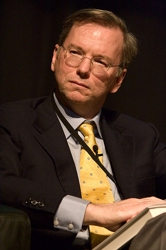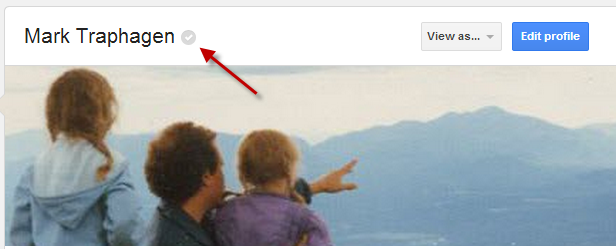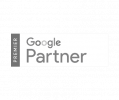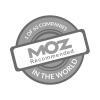
Wherefore art thou, Google Author Rank?
This past weekend The Wall Street Journal published excerpts from an upcoming book by Google Chairman Eric Schmidt. Among Schmidt’s seven predictions for what we can expect in the coming years of the digital age was this intriguing bite:
Within search results, information tied to verified online profiles will be ranked higher than content without such verification, which will result in most users naturally clicking on the top (verified) results. The true cost of remaining anonymous, then, might be irrelevance
As someone who has been deeply immersed in following Google’s Authorship project (aka rel=author), as well as the associated topic of Author Rank, that quote stopped me in my tracks. What else could Scmidt be referring to but Authorship and Author Rank? (For an understanding of those terms, see “What Are Google Author Rank and Authorship?”)
The reason this was a “drop everything and post!” quote for me is we’ve had so little to go on from Google since they first announced the Authorship project in mid-2011.
In this August 2011 Google Webmaster video, listen at the 1 minute mark as Matt Cutts asks Authorship project head Othar Hansson whether rel=author might provide a “rankings boost”:
Hansson replies that they “hope to use this information, and any information, as a ranking signal at Google.” (Did you catch the exchange of sly smiles between Othar and Matt when Othar said “and any information”?) He goes on to say that they want to gather information on the credibility of various authors, and that they are only “experimenting with it now.”
And since then there has been little new information from Google on how they might be using Authorship, or even whether it ever actually would be a ranking signal. At times they have flat-out denied that it presently is a major factor (for example, see “Google Authorship: Does It Affect Search Rankings?“). It is true that they have occasionally updated information on how to implement Authorship, even adding new methods such as email verification. And starting last fall, people who had verified Authorship of their content were receiving emails from Google congratulating them on successful implementation.
But other than that, silence. Until now.
What stands out about the quote from Schmidt’s book is that it appears to be the first public confirmation by a Googler since Matt and Othar’s video that Google intends to implement Author Rank, or something very much like it.
To what else could Schmidt be referring when he mentions “verified online profiles”? One thing that has been clear from the beginning of Google+ is that it is Google’s identity service, a means by which they entice every Google user to create a detailed profile with their real name attached. In fact, one of the first controversies to occur in the Google+ community , now known as the “nymwars,” was over Google’s insistence that profiles use real names. It was obviously important to Google to be able to identify users by their real world IDs.
Schmidt also referred to “information tied to” those verified profiles. This could refer either to the content associated with those profiles, or the social and other signals pointing at them, but likely means both. And there you have Authorship neatly described: “information tied to verified online profiles.”
What about Author Rank? Scmidt goes on to say that content tied to verified profiles “will be ranked higher than content without such verification.” That’s exactly what Author Rank is supposed to do.
What Is a Verified Profile?
When I first wrote about this quotation on Google+, there was some immediate confusion over the meaning of “verified profile.” The confusion stems from Google having used the term verified in two different ways for Google+ profiles. In one usage, a verified profile means a profile that shows a check mark icon next to the owner’s name.

This verification mark has been handed out very sparingly by Google+, at first only to celebrities or people with huge followings, later to people who seemed to be making some impact within the Google+ community. What benefits this verification confers, other than the bragging rights of the check mark, remain unclear.
The other type of verification is Authorship verification. Authorship verification indicates that you have made the correct link between your Google+ profile and your content online, and have also met the other conditions to show an Authorship rich snippet (clear face photo, real name). You test Authorship verification by copying the URL of one of your content pieces in Google’s Structured Data Testing Tool.

So to which verification is Schmidt referring?
I believe it has to be to Authorship verification. Here are my reasons:
- Check mark verification is still too restricted. Only a small minority of Google+ profiles have it, so I don’t see it being a large enough population to be useful to Google.
- Google is interested in rating and promoting authoritative content authors. Not all the check mark profile owners are content creators, or even necessarily the best content creators in their fields.
- The intent Schmidt spoke about exactly matches Authorship Author Rank the way Google has presented it from the beginning
So if you’re a prolific and talented content creator who uses Google Authorship, and your content is widely shared on social media (especially on Google+), the Schmidt quote means it’s time to break out the party hats and celebrate for our day of vindication and reward is nigh, right?
Google Author Rank? Maybe Yes, Maybe No
Here are what I think are some healthy enthusiasm-checks concerning what Schmidt had to say:
41 words is more than a tweet…but not much more. All we have here is two sentences. And more importantly, we don’t have the context in which they appear in Schmidt’s book. While I think my speculation about the references of his terms (“information,” “verified online profiles”) is likely on-target, I could be off, and only the context could make us certain.
Would you build your business strategy off a fortune cookie? This quote is not from a Google technical document. It’s from a book of visionary speculation about possible futures. It doesn’t sound like it’s intended to be a tell-all of insider Google strategy for the coming years. While it’s true that as former president and now chairman of Google, Schmidt is obviously privy to information not available to the rest of us, that doesn’t mean that he’s guaranteeing anything. He could just be saying, “Look, this is where we’d like to head, or think search should head.” But it’s possible that these plans may still be visionary, and not actually on the launch pad waiting for lift-off.
CEOs walk boldly where engineers fear to tread. It’s not entirely uncommon for CEOs to spout off ideas and concepts that their engineers and designers are not yet able to actually pull off.
Where is the supporting cast? Every other testimony we’ve had from Google employees has been very non-committal about the implementation of Author Rank, saying at best that it “probably will be used at some point,” or “may eventually be a useful signal.” They don’t sound like they are rushing to implement it any time soon.
Google won’t roll on a square wheel. There is plenty of evidence that Google probably has some distance to go before Authorship data could be relied upon as a useful signal. Among the signs of that uncertainty are:
- Paucity of adoption among content creators. Despite all the hooplah some of us in the marketing and social/content verticals have been making about it, still only a tiny minority of the web’s regular content creators have intentionally implemented Authorship. I conducted a study of the top 50 most influential people on social media according to Forbes Magazine, and found that only 30% of them appeared to have set up an intentional Authorship connection (read the study here).
- Misattribution. While most of the time the rich snippet Author results show the correct author for the content, they also get it wrong sometimes; sometimes bizarrely wrong. A friend of mine showed me an example of his Vimeo profile being shown in search with the photo and profile link of a famous writer (not my friend). After some investigation, we determined that because the only place where his name appeared on the profile was in an <h1> headline, Google had ignored it and latched on to the famous author’s name that appeared in a promo below the profile.
- Missing use cases. There are numerous types of content for which Google as of yet has no solution for linking to Authorship. For example, there is no provision for articles co-authored by more than one person. And content on some competing social sites is inaccesible to the type of tagging necessary to make Authorship work.
- The anonymous need not apply. This one sticks in the craw of many, who see it tantamount to a human rights violation on Google’s part. Authorship, and therefore Author Rank ranking power, is only for those who are willing to make their actual identity fully public. Schmidt’s book quote reinforces this with harsh finality: “The true cost of remaining anonymous, then, might be irrelevance.” Here is how one person reacted to this news on my original Google+ thread:
This is unfortunately terrible news outside the marketing community. I’m a former VP/Marketing of an Inc1000 company — but also the former execdir of an international human rights NGO in free speech/journalism issues.
Ponder Google’s new search policy in relationship to political controversies in the Arab Spring and you’ll see the problem immediately.
A member of the Syrian resistance isn’t going to set up his or her Google Wallet and expose name and address to Schmidt — and Assad (who, you know, owns the telecoms there) — in order to get page rank.
From the online human rights point of view? “I felt a great disturbance online, as if millions of voices suddenly cried out in terror and were suddenly silenced. I fear something terrible has happened.”
Google’s new motto: “Don’t be evil — just enable it.”
Everything online isn’t about marketing, you know. It can sometimes seem that way — that the content is just there to, you know, sell things? But to many of us it’s the other way around. Selling things allows all the content to flourish. Don’t stunt the ecosystem, one for the other.
So What Do We Know Now?
While Authorship and Author Rank enthusiasts should be interested in any crumb that falls their way off Google’s table, this one may not be as “breaking news” as it sounded at first. At least it can be taken as further confirmation that Google would like to head toward using author trust and confidence as evidenced by real people via social signals as an influence in search results, but the reality of its implementation may still be far away.
I’ll conclude with the words I most despise at the end of any speculative blog post: “Only time will tell” 😉
So….Should I Not Bother with Authorship for Now?
NO! Quite the opposite. While it may be true that Author Rank has not yet been fully implemented, and there might even be some time yet before it is, I think that’s all the more reason to be hooking all your content to Google Authorship right now. The one thing we do know from that early video embedded above is that Google is currently accumulating data on everyone using Authorship. Those who have been early adopters could have a rich history of data deposited in Google’s bank that could give them a big jump over their competition.
Postscript: Nice to see Brian Clark of Copyblogger gets the high potential value of Google+ and Google Authorship. See his post “Get Over Yourself and Get On Google+”












